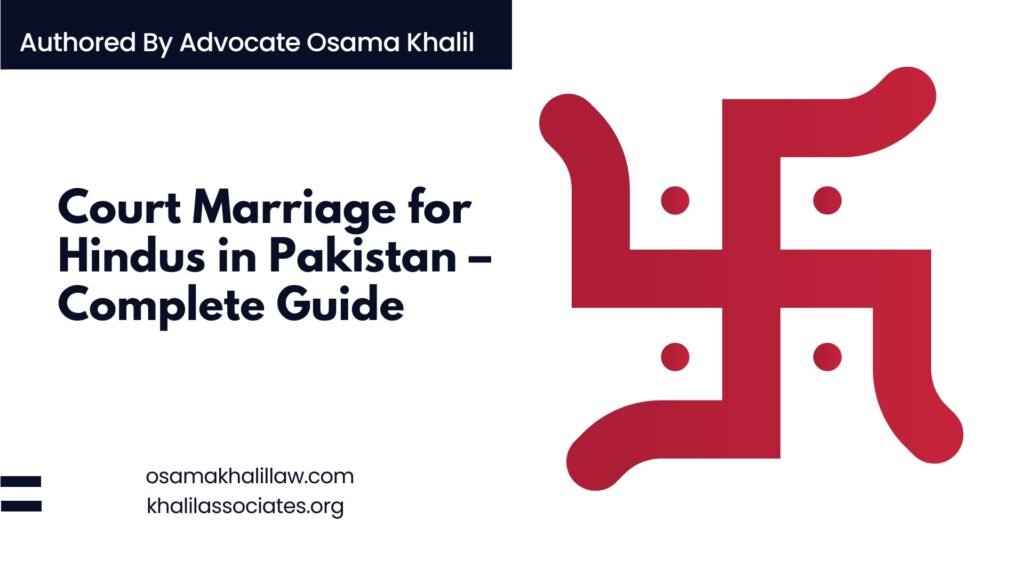
Court marriage for Hindus in Pakistan provides a legal way to register a marriage without traditional ceremonies. Many couples prefer this method because it is simple, quick, and legally binding. The government recognizes court marriages, ensuring rights for both partners.
In Pakistan, Hindu marriages were not officially registered until 2017 when the Hindu Marriage Act was passed. Now, Hindus can legally register their marriages, protecting their rights in matters like inheritance, divorce, and child custody.
This guide explains the complete process, required documents, legal conditions, and benefits of court marriage for Hindus in Pakistan.
What is Court Marriage for Hindus?
Court marriage for Hindus means registering a marriage under the Hindu Marriage Act 2017. Unlike traditional weddings, this process happens in court with legal formalities. The marriage certificate serves as proof, recognized by all government and private institutions.
Since many Hindus in Pakistan face issues with unregistered marriages, court marriage ensures legal protection. Couples can avoid disputes related to property, divorce, or children’s rights by following this process.
Legal Requirements for Hindu Court Marriage in Pakistan
The Hindu Marriage Act 2017 sets specific conditions for court marriage for Hindus. Couples must meet these requirements to register their marriage legally.
Age Limit for Hindu Court Marriage
The groom must be at least 18 years old, and the bride must be at least 16. However, child marriage laws discourage underage marriages, so couples should follow legal age limits.
Consent of Both Parties
Both the bride and groom must agree to the marriage willingly. Forced marriages are illegal, and courts reject such cases.
No Existing Marriage
Neither party should already be married. Bigamy is prohibited, and if discovered, the court will cancel the marriage.
Prohibited Relationships
Close blood relatives cannot marry. The law restricts marriages between siblings, parents and children, or close cousins.
Mental and Physical Fitness
Both individuals must be mentally sound and capable of understanding marriage responsibilities. Severe mental illness or physical incapacity can invalidate the marriage.
Documents Required for Hindu Court Marriage
To complete court marriage for Hindus in Pakistan, couples must submit the following documents:
CNIC or B-Form Copies
Both parties must provide copies of their Computerized National Identity Cards (CNIC). If the bride or groom is under 18, they must submit a B-Form.
Affidavit of Free Will
A sworn statement declaring that both partners enter the marriage willingly, without any pressure.
Passport-Sized Photographs
Recent photographs of both the bride and groom, usually two copies each.
Marriage Registration Form
A filled application form available at the marriage registrar’s office.
Witnesses
Two witnesses with their CNICs must be present during the registration process.
Divorce Decree (If Applicable)
If either party was previously married, they must provide a divorce certificate or death certificate of the former spouse.
Step-by-Step Process of Hindu Court Marriage in Pakistan
The process of court marriage for Hindus is straightforward if all documents are ready. Here’s how it works:
Step 1: Visit the Marriage Registrar’s Office
Couples must visit the local marriage registrar’s office under the Hindu Marriage Act. Each district has a designated office.
Step 2: Submit the Application
They must submit the marriage application along with all required documents.
Step 3: Verification Process
The registrar verifies the details and checks if both parties meet legal conditions.
Step 4: Publication of Notice (If Required)
Some regions require a public notice for objections. If no one raises an issue within a set period, the process continues.
Step 5: Marriage Ceremony in Court
The couple, along with witnesses, appears before the registrar. They sign the marriage certificate, making the union legal.
Step 6: Issuance of Marriage Certificate
After completing formalities, the registrar issues an official marriage certificate. This document is proof of a valid Hindu court marriage.
Benefits of Court Marriage for Hindus in Pakistan
Court marriage offers several advantages over traditional weddings. Here’s why many Hindus prefer this method:
Legal Recognition
A registered marriage is valid in all legal matters, including inheritance, divorce, and child custody.
Quick and Simple Process
Unlike lengthy wedding ceremonies, court marriage takes only a few days.
Protection of Rights
Women and children get legal protection in case of disputes or separation.
No Risk of Fraud
Since the government verifies details, fake marriages are less likely.
Easier Visa and Immigration Process
A marriage certificate helps in applying for visas or residency abroad.
Challenges in Hindu Court Marriage in Pakistan
Despite the benefits, some challenges exist:
Social Pressure
Many families prefer traditional weddings and may oppose court marriages.
Lack of Awareness
Some Hindus are unaware of the registration process, leading to unregistered marriages.
Legal Delays
In some cases, bureaucratic hurdles slow down the process.
Conclusion
Court marriage for Hindus in Pakistan is a secure and legal way to register a marriage. The Hindu Marriage Act 2017 ensures rights for couples, protecting them in legal matters. By following the correct procedure and submitting necessary documents, Hindus can easily complete their court marriage.
If you plan to register your marriage, visit the local marriage registrar’s office and start the process today. Legal marriage not only secures your rights but also simplifies future legal procedures.
Legal Assistance
For professional legal guidance and support in immigration matters, you may contact:
Mr. Osama Khalil
Lawyer & Legal Consultant
📞 Phone: 0316-1829946
📧 Email: contact@osamakhalillaw.com | contact@khalilassociates.org
